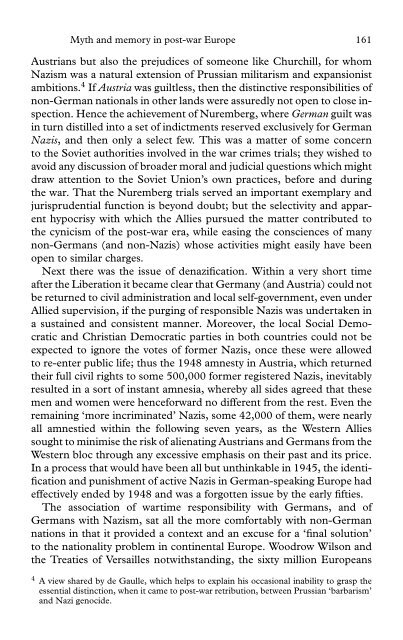Memory and Power in Post-War Europe: Studies in the Presence of ...
Memory and Power in Post-War Europe: Studies in the Presence of ...
Memory and Power in Post-War Europe: Studies in the Presence of ...
You also want an ePaper? Increase the reach of your titles
YUMPU automatically turns print PDFs into web optimized ePapers that Google loves.
Myth <strong>and</strong> memory <strong>in</strong> post-war <strong>Europe</strong> 161<br />
Austrians but also <strong>the</strong> prejudices <strong>of</strong> someone like Churchill, for whom<br />
Nazism was a natural extension <strong>of</strong> Prussian militarism <strong>and</strong> expansionist<br />
ambitions. 4 If Austria was guiltless, <strong>the</strong>n <strong>the</strong> dist<strong>in</strong>ctive responsibilities <strong>of</strong><br />
non-German nationals <strong>in</strong> o<strong>the</strong>r l<strong>and</strong>s were assuredly not open to close <strong>in</strong>spection.<br />
Hence <strong>the</strong> achievement <strong>of</strong> Nuremberg, where German guilt was<br />
<strong>in</strong> turn distilled <strong>in</strong>to a set <strong>of</strong> <strong>in</strong>dictments reserved exclusively for German<br />
Nazis, <strong>and</strong> <strong>the</strong>n only a select few. This was a matter <strong>of</strong> some concern<br />
to <strong>the</strong> Soviet authorities <strong>in</strong>volved <strong>in</strong> <strong>the</strong> war crimes trials; <strong>the</strong>y wished to<br />
avoid any discussion <strong>of</strong> broader moral <strong>and</strong> judicial questions which might<br />
draw attention to <strong>the</strong> Soviet Union’s own practices, before <strong>and</strong> dur<strong>in</strong>g<br />
<strong>the</strong> war. That <strong>the</strong> Nuremberg trials served an important exemplary <strong>and</strong><br />
jurisprudential function is beyond doubt; but <strong>the</strong> selectivity <strong>and</strong> apparent<br />
hypocrisy with which <strong>the</strong> Allies pursued <strong>the</strong> matter contributed to<br />
<strong>the</strong> cynicism <strong>of</strong> <strong>the</strong> post-war era, while eas<strong>in</strong>g <strong>the</strong> consciences <strong>of</strong> many<br />
non-Germans (<strong>and</strong> non-Nazis) whose activities might easily have been<br />
open to similar charges.<br />
Next <strong>the</strong>re was <strong>the</strong> issue <strong>of</strong> denazification. With<strong>in</strong> a very short time<br />
after <strong>the</strong> Liberation it became clear that Germany (<strong>and</strong> Austria) could not<br />
be returned to civil adm<strong>in</strong>istration <strong>and</strong> local self-government, even under<br />
Allied supervision, if <strong>the</strong> purg<strong>in</strong>g <strong>of</strong> responsible Nazis was undertaken <strong>in</strong><br />
a susta<strong>in</strong>ed <strong>and</strong> consistent manner. Moreover, <strong>the</strong> local Social Democratic<br />
<strong>and</strong> Christian Democratic parties <strong>in</strong> both countries could not be<br />
expected to ignore <strong>the</strong> votes <strong>of</strong> former Nazis, once <strong>the</strong>se were allowed<br />
to re-enter public life; thus <strong>the</strong> 1948 amnesty <strong>in</strong> Austria, which returned<br />
<strong>the</strong>ir full civil rights to some 500,000 former registered Nazis, <strong>in</strong>evitably<br />
resulted <strong>in</strong> a sort <strong>of</strong> <strong>in</strong>stant amnesia, whereby all sides agreed that <strong>the</strong>se<br />
men <strong>and</strong> women were henceforward no different from <strong>the</strong> rest. Even <strong>the</strong><br />
rema<strong>in</strong><strong>in</strong>g ‘more <strong>in</strong>crim<strong>in</strong>ated’ Nazis, some 42,000 <strong>of</strong> <strong>the</strong>m, were nearly<br />
all amnestied with<strong>in</strong> <strong>the</strong> follow<strong>in</strong>g seven years, as <strong>the</strong> Western Allies<br />
sought to m<strong>in</strong>imise <strong>the</strong> risk <strong>of</strong> alienat<strong>in</strong>g Austrians <strong>and</strong> Germans from <strong>the</strong><br />
Western bloc through any excessive emphasis on <strong>the</strong>ir past <strong>and</strong> its price.<br />
In a process that would have been all but unth<strong>in</strong>kable <strong>in</strong> 1945, <strong>the</strong> identification<br />
<strong>and</strong> punishment <strong>of</strong> active Nazis <strong>in</strong> German-speak<strong>in</strong>g <strong>Europe</strong> had<br />
effectively ended by 1948 <strong>and</strong> was a forgotten issue by <strong>the</strong> early fifties.<br />
The association <strong>of</strong> wartime responsibility with Germans, <strong>and</strong> <strong>of</strong><br />
Germans with Nazism, sat all <strong>the</strong> more comfortably with non-German<br />
nations <strong>in</strong> that it provided a context <strong>and</strong> an excuse for a ‘f<strong>in</strong>al solution’<br />
to <strong>the</strong> nationality problem <strong>in</strong> cont<strong>in</strong>ental <strong>Europe</strong>. Woodrow Wilson <strong>and</strong><br />
<strong>the</strong> Treaties <strong>of</strong> Versailles notwithst<strong>and</strong><strong>in</strong>g, <strong>the</strong> sixty million <strong>Europe</strong>ans<br />
4 A view shared by de Gaulle, which helps to expla<strong>in</strong> his occasional <strong>in</strong>ability to grasp <strong>the</strong><br />
essential dist<strong>in</strong>ction, when it came to post-war retribution, between Prussian ‘barbarism’<br />
<strong>and</strong> Nazi genocide.
















